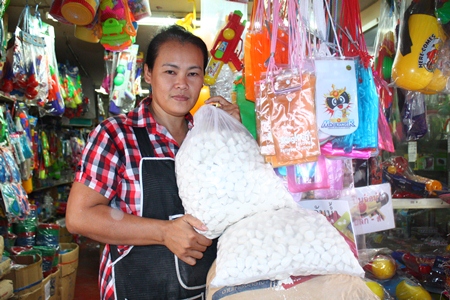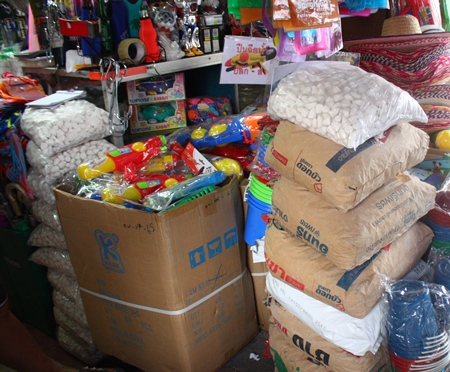It should have been no surprise that a government ban on the throwing of white powder during Songkran had the same chance of success as baht bus passengers remaining dry while passing Soi 8.
In addition to its usual prohibitions against PVC water cannons and skimpy clothing, the government’s injunction against powder, chalk and similar substances was roundly ignored during the Thai New Year, despite the very real hazards posed by ceiling coatings, talcum and other substances substituted for traditional mudstone.
 Thongrien Premviani, owner of the Rungcharoen shop in Pattaya, says her chalk sells well during Songkran. Good quality chalk must be white and has no black or any other material, she said.
Thongrien Premviani, owner of the Rungcharoen shop in Pattaya, says her chalk sells well during Songkran. Good quality chalk must be white and has no black or any other material, she said.
Much like the muck masquerading as water in Pattaya’s Songkran buckets, the powder slapped on faces and rubbed in eyes of unwilling participants wasn’t always what it seemed. Unscrupulous vendors packaged up colored chalk, gypsum or even roadside dirt to sell for a few baht. It’s no wonder the Health Ministry warned powder throwing could lead to eye irritation, skin rashes and other allergic reactions.
After trying to outright ban its use in popular tourist areas, the government backed down, simply urging being to play responsibly.
Thongrien Premviani, owner of the Rungcharoen shop in Pattaya, said she only sold the calcium carbonate harvested from the earth in Lopburi, the source of the true marlstone (mudstone) powders used during the days when Songkran was a respectful holiday.
She sold about 1,000 bags of powder, mostly to vendors, who cut it down into smaller lots to sell to Songkran revelers.
“I don’t believe throwing chalk mixed with colors is a pretty sight and its very dangerous for those with allergies,” she said. “I think people should play with manners and politeness as Songkran used to be a beautiful tradition.”





